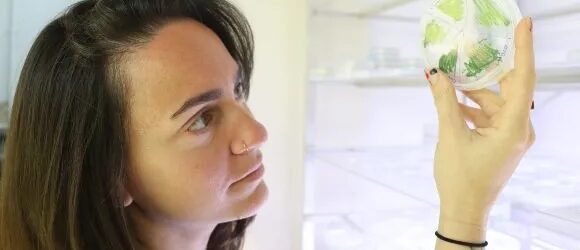TAU post-doc Tamar Elman is creating a startup to harness hydrogen gas produced by algae during photosynthesis.
Recent reports that 2023 was the world’s hottest year on record highlights the urgency of mitigating climate change. One unavoidable change will be to clean up the energy sector, which currently produces 70% of industrial waste including greenhouse gases and ozone-eroding chemicals. The solution may come in the form of a tiny single-celled organism which most may recognize as the green layer on top of lakes and ponds: algae. Tamar Elman, a Tel Aviv University post-doctoral researcher in the lab of Iftach Yacoby at the Wise Faculty of Life Science, has discovered a microalgae species with a mutation which produces large amounts of hydrogen gas, a promising clean energy source. After completing a course at TAU’s Entrepreneurship Center, she is building a startup to figure out how this hydrogen production might be harnessed and industrialized.
An Accidental Discovery
Hydrogen gas is a very clean source of energy because its only byproduct is water vapor. “Unfortunately,” says Elman, “because it does not naturally accumulate anywhere in large amounts, producing hydrogen gas in a usable form does produce carbon waste. So there is a race right now to create a totally green production method that is also scalable and profitable.”
“There is a race right now to create a totally green production method that is also scalable and profitable.”
One natural source of hydrogen gas is microalgae, which is found in most habitats around the world and grows easily. In 2021, Elman was trying to increase the small amounts of hydrogen gas produced by microalgae in the TAU Yacoby lab. “Microalgae are considered plants because they perform photosynthesis, using solar energy to transform carbon dioxide into sugars for nourishment. However, green algae also have a built-in “circuit breaker” that burns off any excess solar energy by converting it to hydrogen gas. Unfortunately, hydrogen production is usually shut down quickly by other functions of the algae.
One day, Elman and Prof. Yacoby tested a new culture and saw the hydrogen levels reaching unprecedented heights. “We thought we were seeing a mistake in the hydrogen measuring device. We almost threw out the culture!” Says Elman. “But when we tried it on a different device and got the same results, we realized we had found a mutated algae strain that naturally overcame the barriers to continued hydrogen gas production.”
Scaling Up
Upon publishing a paper in 2022 on their discovery, Elman and Prof. Yacoby garnered quite a bit of interest from the scientific community. The two decided to capitalize on the buzz, delving further into experimentation on their mutation. Elman also won a grant from the Israeli Innovation Authority which required she take a course on breaking into industry at TAU’s Entrepreneurship Center.
Elman and Yacoby nailed down their idea to produce hydrogen gas for the energy sector and to work with the food industry to sell the used algae, which is left with high nutritional value after the production process.
Elman and Prof. Yacoby hope to industrialize microalgae-based hydrogen gas production. (Photo: Tel Aviv University)
The two discovered that scaling up creates its own host of challenges, as processes that work at small scales may not always translate proportionally. Elman realized she would need a very simple way to induce hydrogen production in the algae. “It’s almost comical how basic this method is,” she says of her solution. “All I do is give the algae some concentrated acid and let them sit in the dark for two hours breathing oxygen. Then I open the windows to let light in, and the algae start producing hydrogen! It’s practically too simple to market, but it really works.”
Elman spent the last year gathering her data and creating material for investors and industry stakeholders with the help of her Entrepreneurship Center team. Now, she is meeting with investors. “Even though it’s very difficult, I know I would regret not trying. And it’s an amazing feeling to see my research lead to something concrete.”
Her next steps are, she hopes, to build a large photobioreactor that can be used for larger-scale experiments and production.
Thinking Like an Entrepreneur
To learn what is needed to create a startup and collaborate with industry, Elman participated in a course called JumpTAU which brought together Arab and Jewish students in mixed startup-building teams at TAU’s Entrepreneurship Center. For months, the teams received intensive lectures, individual guidance and networking opportunities from industry experts and dedicated mentors.
“Entrepreneurship is a different type of thinking. I had to figure out who my audience was and how to frame my work as beneficial to them.”
After performing scientific research for 9 years, says Elman, “entrepreneurship is a really different type of thinking. I discovered that customers and investors aren’t interested in science for science’s sake, so I had to figure out who my audience was and how to frame my work as beneficial to them. Now a year later, I have a professional slide deck I can proudly show to investors.”
She felt particularly supported by the mentors and Center Director Yair Sakov, all of whom she says she can still turn to for ongoing counsel. “I really feel like those at the Center care about my success.”
